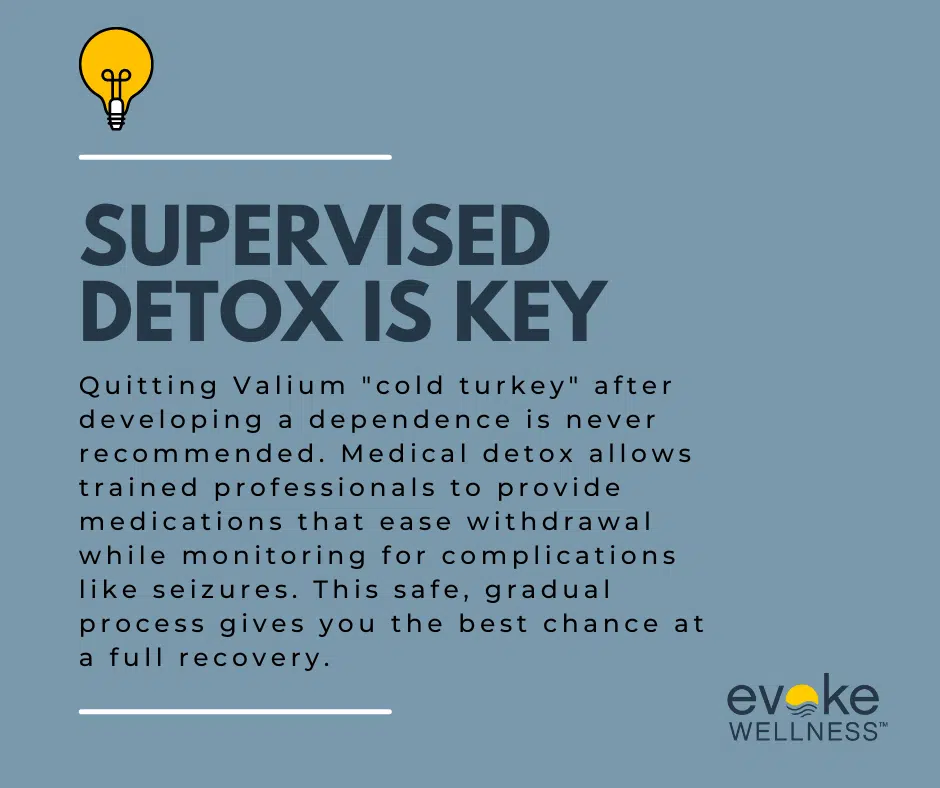Are you or a loved one struggling with Valium addiction? You’re not alone. Recent studies show that benzodiazepine abuse, including Valium, has risen sharply in recent years. In 2019, over 16% of opioid overdose deaths also involved benzodiazepines. Fortunately, effective treatment options are available. This article will explore Valium addiction and the specialized programs designed to help you overcome dependence on this powerful sedative. You’ll learn about evidence-based approaches like cognitive behavioral therapy, medical detox protocols, and holistic treatments tailored for benzodiazepine recovery. By understanding your options, you can take the first step towards reclaiming your health and freedom from Valium addiction.
Together, let’s embrace the journey to recovery and the promise of a new beginning. Call us at (833) 819-6066 today or reach out online.
What is Valium Addiction?
Valium’s Addictive Nature
Valium (diazepam) is a highly addictive benzodiazepine medication prescribed for conditions like anxiety, insomnia, and muscle spasms. While it provides therapeutic relief, Valium carries a significant risk of dependence and addiction, especially with long-term or high-dose use. In fact, Valium is the third most widely abused tranquilizer in the United States, trailing only Xanax and Ativan.
Developing Dependence
Many people initially receive a legitimate Valium prescription from their doctor. However, the brain can quickly adapt to the drug’s effects, leading to tolerance and the need for higher doses to achieve the same results. This process can rapidly spiral into physical and psychological dependence, where individuals experience intense cravings, withdrawal symptoms, and the inability to control their Valium use.
Withdrawal Dangers
Attempting to quit Valium “cold turkey” can be extremely dangerous due to the risk of severe, potentially life-threatening withdrawal symptoms like seizures. Medically supervised detoxification is crucial to safely manage withdrawal under the care of addiction treatment professionals who can provide medication and around-the-clock monitoring.
Finding Professional Help
Overcoming Valium addiction often requires comprehensive treatment at a specialized addiction rehab facility. Inpatient programs combine medical detox with evidence-based therapies, dual diagnosis treatment for co-occurring mental health issues, and holistic approaches to address the root causes of addiction and promote lasting recovery.
Understanding the Causes of Valium Addiction
Prescribed Use Turned Abuse
Diazepam, commonly known as Valium, is a benzodiazepine medication initially developed in the 1960s to treat conditions like anxiety, insomnia, and muscle spasms. While prescribed for legitimate medical purposes, Valium’s calming effects and ability to induce feelings of euphoria make it highly addictive, especially when misused or taken in excess.
Many individuals who develop a Valium addiction started using the drug after receiving a valid prescription from their doctor. However, they may learn to manipulate healthcare providers to obtain more prescriptions, falsely claiming that other methods are ineffective.
Brain Chemistry and Dependence
Repeated Valium use alters the brain’s chemistry, leading to tolerance and physical dependence. As the brain adjusts to the drug’s presence, it becomes increasingly difficult to experience the desired effects without increasing the dosage, perpetuating a cycle of abuse.
When Valium use is abruptly stopped, the brain’s chemical imbalance triggers withdrawal symptoms that can be severe and even life-threatening, such as seizures, anxiety, and depression. This dependence makes it incredibly challenging for individuals to quit Valium on their own, often requiring professional medical intervention.
Potentiation and Poly-Substance Abuse
Another significant contributor to Valium addiction is the practice of potentiation, where individuals intentionally combine the drug with other substances to enhance or prolong its effects. Mixing Valium with alcohol, opioids, or other central nervous system depressants can lead to respiratory depression, coma, and accidental overdose.
This poly-substance abuse not only increases the risk of adverse health consequences but also amplifies the addictive properties of Valium, making it even more challenging to break free from the cycle of substance misuse.
Recognizing the underlying causes of Valium addiction is crucial for developing effective treatment strategies. By addressing the physical and psychological aspects of dependence, individuals can embark on a journey toward lasting recovery and regain control over their lives.
Recognizing the Symptoms of Valium Addiction
Physical Symptoms
The physical symptoms of Valium addiction can manifest in various ways. Initial signs may include drowsiness, fatigue, poor coordination, and slurred speech. As the addiction progresses, users may experience nausea, headaches, and tremors. According to research, withdrawal from benzodiazepines like Valium can trigger irritability, nausea, headaches, and muscle pain within the first 24-48 hours after the last dose.
Psychological Effects
Valium addiction often takes a toll on an individual’s mental health and emotional well-being. Common psychological symptoms include anxiety, depression, mood swings, and difficulty concentrating. Users may also experience paranoia, delusions, and suicidal thoughts. Snorting crushed Klonopin pills, a similar benzodiazepine, can lead to cognitive impairment and suicidal ideation.
Behavioral Changes
Recognizing behavioral changes is crucial in identifying Valium addiction. Users may exhibit secrecy, lying, or stealing to obtain the drug. They may also neglect responsibilities, lose interest in hobbies, and isolate themselves from loved ones. Signs of benzodiazepine abuse include not using the medication as prescribed, “doctor shopping” for multiple prescriptions, and mood swings.
Withdrawal Symptoms
As Valium addiction progresses, users may experience severe withdrawal symptoms when attempting to quit. Peak withdrawal typically occurs 3-5 days after the last dose, characterized by anxiety, irritability, shaking, restlessness, and palpitations. Insomnia and difficulty concentrating can persist for weeks, further complicating the recovery process.
By recognizing these physical, psychological, behavioral, and withdrawal symptoms, individuals can seek professional help and support to overcome Valium addiction and regain control over their lives.
The Dangers of Valium Addiction
Physical and Mental Impacts
Valium (diazepam) addiction poses serious risks to your physical and mental health. Withdrawal symptoms like nausea, headaches, anxiety, and insomnia can be severe, even life-threatening if not properly managed. Long-term use causes physical dependence, making it incredibly difficult to quit without professional help.
Deadly Combinations
Mixing Valium with other depressants like alcohol or opioids is extremely dangerous and a leading cause of overdose deaths. Both substances slow heart rate, breathing, and cognitive function in a potentially fatal combination. Even herbal remedies can adversely interact, clouding judgment and increasing addiction risks.
Loss of Control
As addiction takes hold, people often resort to illegal means to obtain more Valium, like doctor shopping or buying from dealers. This downward spiral destroys relationships, jobs, and financial security as the drug becomes the sole focus. Overdosing becomes a real risk as tolerance builds.

Exploring Treatment Options for Valium Addiction
Detox and Withdrawal Management
The first crucial step in treating Valium (diazepam) addiction is safely discontinuing use through a supervised medical detox program. Attempting to quit “cold turkey” can lead to severe, even life-threatening withdrawal symptoms. Detox allows the body to eliminate Valium while managing withdrawal under 24/7 medical monitoring. Medications may be used to minimize discomfort and reduce cravings.
Inpatient Rehab Programs
After detox, many require a higher level of care through an inpatient or residential addiction treatment program. These intensive programs provide a structured, substance-free environment ideal for focusing solely on recovery. Through individual and group therapy, you’ll address the root causes of addiction and develop essential coping mechanisms.
Medication-Assisted Treatment
Certain medications can be highly beneficial when used in conjunction with behavioral therapies. Medication-assisted treatment (MAT) helps manage cravings and withdrawal symptoms, increasing the likelihood of successful long-term recovery from Valium dependence. Common MAT options include methadone, Suboxone, and Vivitrol.
Dual Diagnosis Treatment
A large percentage of those battling Valium addiction also struggle with co-occurring mental health disorders like anxiety, depression or trauma. Dual diagnosis treatment programs integrate comprehensive mental health services to simultaneously address substance abuse and any underlying psychological conditions contributing to addictive behaviors.
Holistic and Alternative Therapies
Many rehab centers incorporate holistic mind-body practices like yoga, meditation, art therapy, and mindfulness training. These alternative approaches promote healing by reducing stress and providing healthy outlets. Some even explore natural alternatives to Valium like herbal supplements, aromatherapy and lifestyle changes.
Aftercare and Relapse Prevention
Recovery is an ongoing process that requires comprehensive aftercare services to maintain sobriety. Outpatient counseling, sober living homes, 12-step programs and alumni support all reinforce the tools and strategies learned in treatment. Relapse prevention plans identify personal triggers and prepare you to manage cravings as they arise.
With a multi-pronged, personalized approach, professional addiction treatment gives you the greatest chance at overcoming Valium dependence and achieving lasting recovery. Treatment centers like Evoke Wellness at Miramar provide the full continuum of care needed to reclaim your health and start healing.
FAQ on Valium Addiction Treatment Programs
Valium Dependence & Withdrawal
- Valium (diazepam) is a benzodiazepine that is highly addictive, even when taken as prescribed. Physical dependence can develop, leading to severe withdrawal symptoms like seizures, tremors, and anxiety if the drug is abruptly stopped.
- Attempting to detox from Valium at home can be extremely dangerous and life-threatening. Medical supervision and medication-assisted treatment are crucial for safely managing withdrawal and reducing complications.
Professional Detox Programs
- Evoke Wellness at Miramar offers a comprehensive, personalized Valium detox program overseen by highly trained professionals. This ensures a safe and effective recovery process.
- Our Benzo Addiction Treatment program includes medical detox, medication-assisted treatment (MAT), and various evidence-based therapies like CBT, DBT, and EMDR to address Valium withdrawal and support long-term recovery.
- Attending a professional detox program instead of attempting at-home detox is strongly recommended, as it can significantly reduce withdrawal duration and the risk of post-acute withdrawal syndrome (PAWS).
Comprehensive Treatment Approach
- After detox, comprehensive addiction treatment including therapy, counseling, and support groups can help achieve lasting recovery from Valium addiction.
- Dual Diagnosis Treatment is available for clients with co-occurring mental health disorders like anxiety or depression, in addition to Valium dependence.
- Holistic therapies like yoga, meditation, and nutrition are integrated into the treatment plan, along with aftercare and relapse prevention programs to maintain sobriety.
Conclusion
In conclusion, understanding Valium addiction and exploring treatment options is crucial for those struggling with dependence. With proper support and evidence-based programs, recovery is possible. By seeking help from qualified professionals and leveraging available resources, you can overcome Valium addiction and reclaim control of your life. Remember, recovery is a journey, not a destination. With dedication and the right support system, you can achieve lasting sobriety and improved overall well-being. Don’t hesitate to reach out for help – your path to recovery begins with that first step.
Begin Your Journey with Evoke Wellness at Miramar
If you or a loved one is considering treatment, Evoke Wellness at Miramar invites you to contact us. Our compassionate team is ready to answer your questions, discuss your needs, and help you take the first steps toward recovery. In Miramar, you’ll find more than just a treatment program – you’ll discover a community dedicated to your wellness and success. Together, let’s embrace the journey to recovery and the promise of a new beginning. Call us at (833) 819-6066 today or reach out online.


